GELA aims to enhance evidence-informed guideline recommendations for newborn and child health in South Africa, Malawi and Nigeria.
ENGAGING: Scoping priority topics and capacity needs
Activities
- Identification of national priority topics within child health
- Identification capacity needs
Key deliverables
- List of priority topics
- Research publication on the quality of available CPGs for child health in each country
- Malawi newborn and child health national clinical practice guidelines: a landscape analysis
- Newborn and child health national and provincial clinical practice guidelines in South Africa, Nigeria and Malawi: a scoping review
- Using a priority setting exercise to identify priorities for guidelines on newborn and child health in South Africa, Malawi, and Nigeria
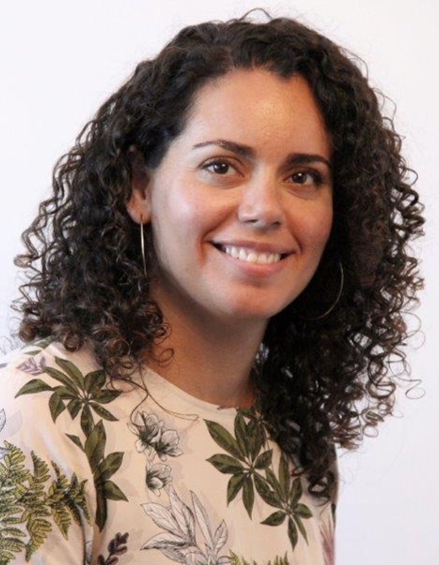 |  |
Solange Durao Health Systems Research Unit South African Medical Research Council Email: solange.durao@mrc.ac.za |
| Identifying priorities for newborn and child health guidelines |

This priority setting project is part of the larger GELA project. The purpose of the GELA project is to maximise the impact of research on poverty-related diseases through enhancing decision-makers’ capacity to use global research to develop locally relevant guidelines for poverty-related diseases (PRDs) in the field of newborn and child health. The project will support decision-makers in Malawi, Nigeria and South Africa, and build on and add value to the large-scale programme of child health clinical practice guideline (CPG) development lead by the World Health Organization (WHO), with adaptation and implementation lead by WHO Afro regional office and national ministries. The first step in this process is to identify priorities for guidance regarding PRDs in the field of newborn and child health, which is what this project aims to do. Access the Participant information sheet here
To inform the priority setting process and clinical practice guideline capacity needs, we conducted a landscape analysis of clinical practice guidelines for newborn and child health in South Africa, Malawi and Nigeria. The aim of this landscape analysis was to assess methodological and reporting quality of publicly available clinical practice guidelines published within the last 5 years (2017 – 2022) and identify gaps in topics and content covered. Our findings highlighted the importance of ongoing efforts to strengthen capacity and support clinical practice guideline development with collaboration between policymakers, researchers and all relevant stakeholders. We further highlight gaps in current topics or conditions that contribute to the burden of diseases in newborn and child health in each country, including malnutrition, neonatal and congenital disorders, as well as the coexistence of conditions.
Access the reports of these landscape analyses below
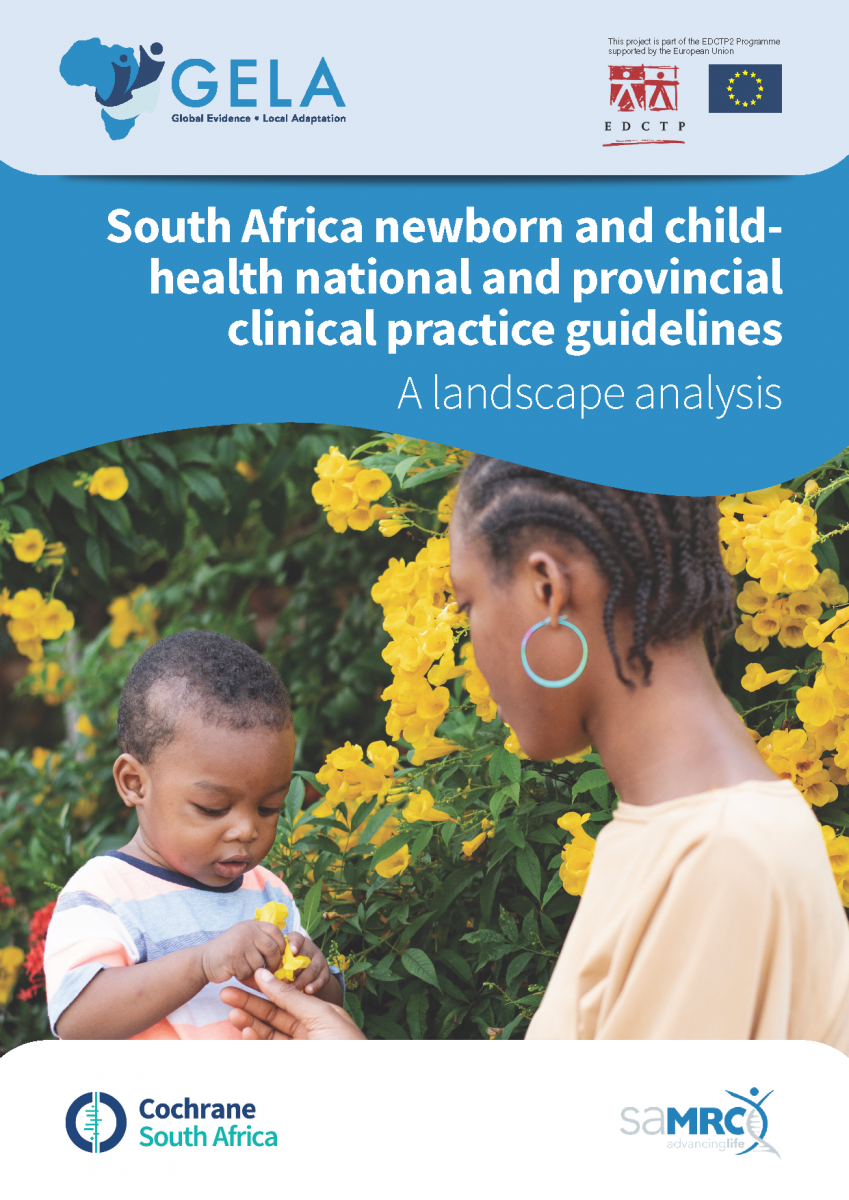 | 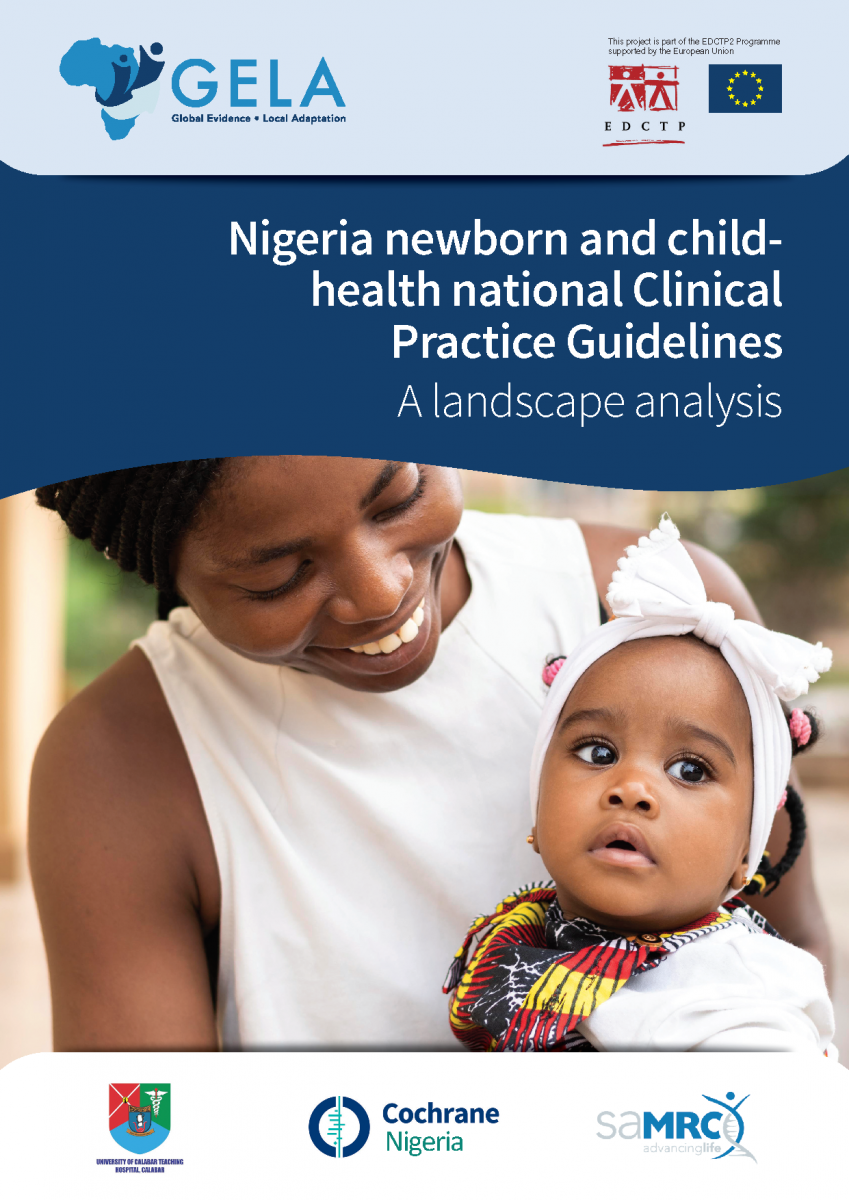 | 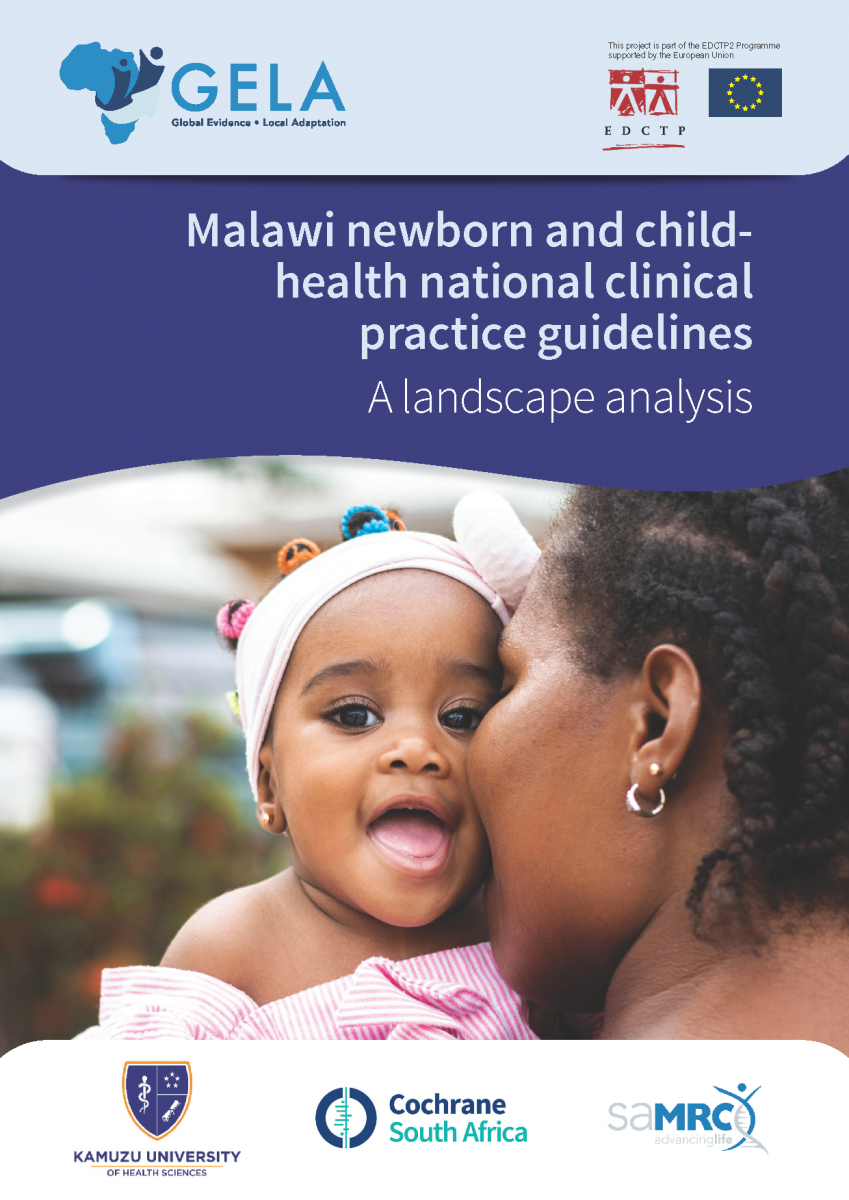 |
SYNTHESISE: Support policy makers and researchers to find, appraise and use best-available systematic reviews and guidelines addressing priority topics on newborn and child health
Activities
- Find and appraise available CPGs
- Find and appraise systematic reviews of effectiveness, acceptability, feasibility and equity impacts and costing
- Collaborate to complete rapid reviews systematic reviews, if needed
Key deliverables
- Research outputs of scoping reviews on available CPGs and available systematic reviews for priority topics (up to nine)
- Systematic reviews of effectiveness and qualitative evidence (up to three)
- Early versus delayed enteral nutrition in critically ill children under 12 years of age: A systematic review and meta-analysis of randomised controlled trials
- Factors that influence the provision of enteral feeding for critically ill children: a qualitative evidence synthesis
- Home visits for preterm/low birthweight infants in South Africa: Qualitative evidence synthesis
- Iron supplementation in children to prevent deficiency and anaemia: A qualitative synthesis
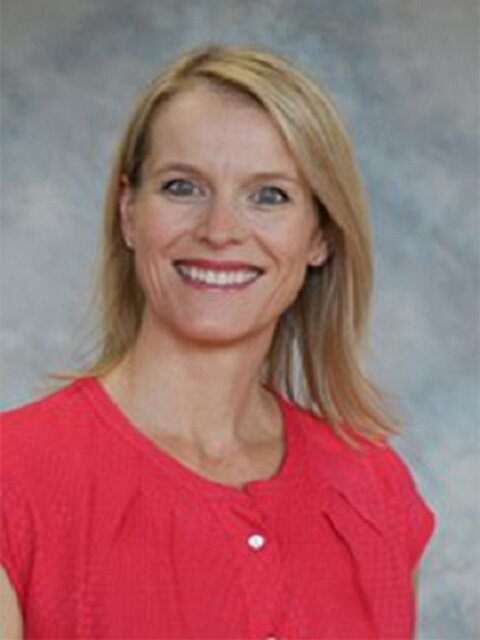 |
DECIDE: Support guideline panels’ capacity to contextualise global evidence using transparent, digitally supported standards and WHO methods for guideline development
Activities
Key deliverables
- Three national CPGs developed on priority child health topics.
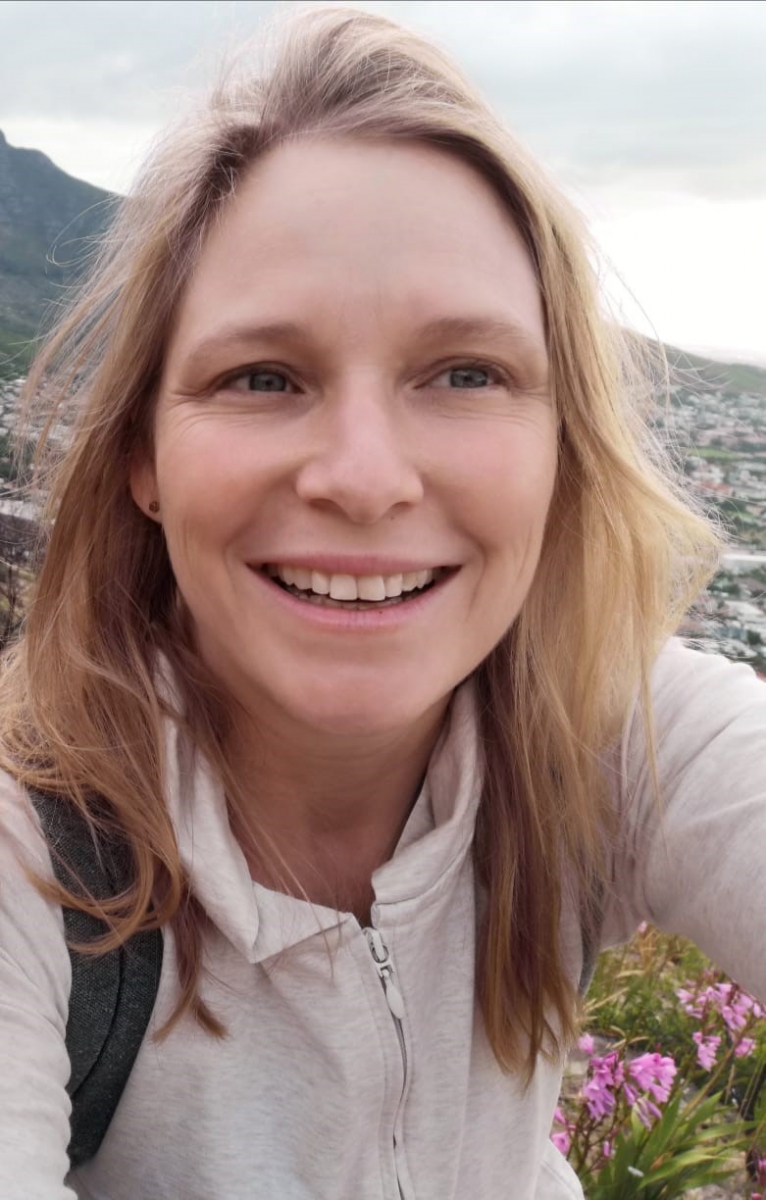 | 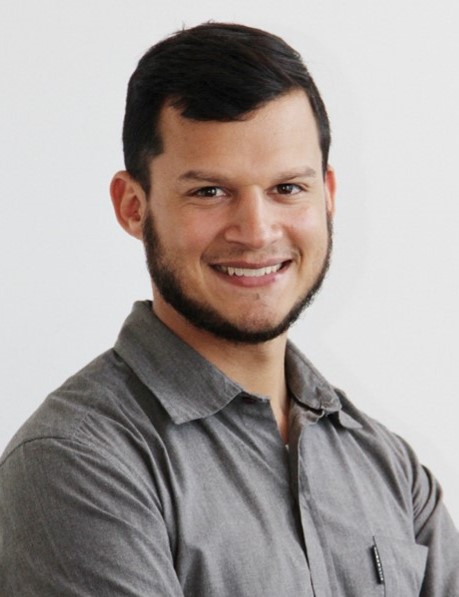 |
Tamara Kredo Health Systems Research Unit South African Medical Research Council Email: tamara.kredo@mrc.ac.za | Ameer Hohlfeld Health Systems Research Unit South African Medical Research Council Email: ameer.hohlfeld@mrc.ac.za |
DISSEMINATION AND COMMUNICATION: Innovative formats and methods to share CPG recommendations and project findings
Activities
- Producing and testing dissemination formats of all recommendations for three audiences – public, patients and healthcare providers
- Communications about other aspects of project (e.g., conferences, publications, website, newsletters, networks)
Key deliverables
- CPG recommendations in appropriate formats for different audiences disseminated
- Website, project communication products developed and disseminated
- Developing and planning country-specific integrated knowledge translation strategies: experiences from the GELA project in Malawi, Nigeria, and South Africa
- Dissemination strategies of clinical practice guidelines-mixed methods evidence synthesis protocol
 | 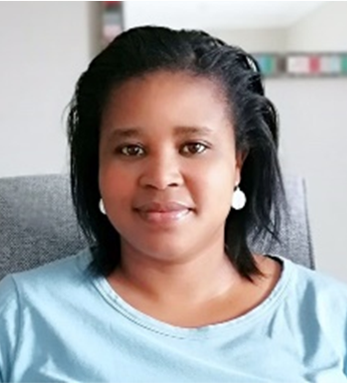 |
| Per Olav Vandvik MAGIC Evidence Ecosystem Foundation Email: per@magicevidence.org | Bey-Marrie Schmidt South African Medical Research Council Email: bey-marrie.schmidt@mrc.ac.za |
CAPACITY BUILDING: Strengthen capacity of researchers and policy makers for all aspects of guideline development, adaptation and dissemination
Activities
- Bursaries for university short courses on systematic reviews and CPG methods
- Online workshops on WHO CPG panel simulation on MAGICapp platform, provide bursaries for master’s and post-doctoral students working in evidence-informed policy and practice
- Convene a Community of Practice for CPG group members and researchers across countries
Key deliverables
- Masters bursaries awarded
- Post-doctoral students’ part of the project team
- Policymakers and researchers attending university short courses
- Community of Practice established
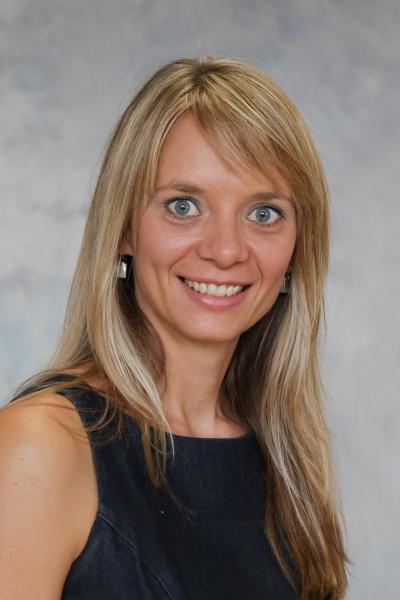 | 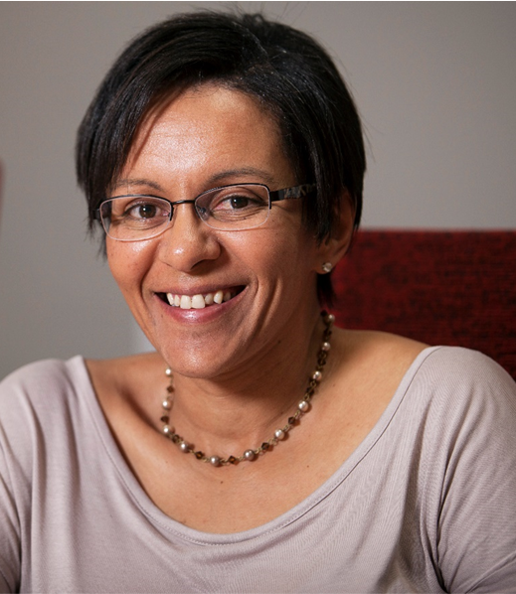 |
EVALUATE: Monitor and evaluate policy makers' experiences of this approach, preferences for receiving evidence, capacity development and overall impact of the project on evidence-informed decision-making processes
Activities
Use M&E approaches
- To monitor ongoing engagement with local stakeholders across work packages
- To review stakeholders’ evolving capacity strengthening needs and to evaluate the difference that learning opportunities make
- Explore panellists’ experiences with reading and using evidence from qualitative reviews, including their preferences regarding the manner in which qualitative review findings are summarised and presented
- Producing and testing dissemination formats of all recommendations for three audiences – public, patients and healthcare providers (i.e satisfaction and ease of use, ‘usability testing’)
- Overall project evaluation to understand the participants overall experiences with participating in the project, including the difference that this project is making for future evidence-informed decision-making and CPG adaptation processes in their country
- Key deliverables: Research publications: capacity needs and impact of training; preferred formats for contextual qualitative evidence syntheses, overall project evaluation
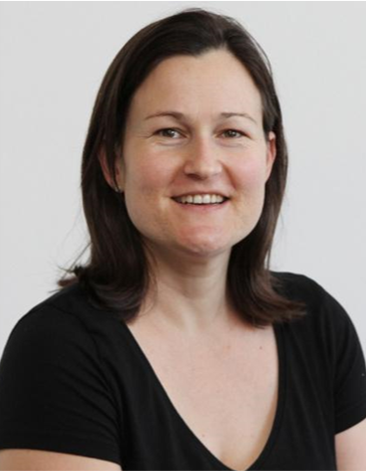 |  |
| Sara Cooper Cochrane South Africa South African Medical Research Council Email: sara.cooper@mrc.ac.za | Simon Lewin Depart of Health Sciences Alesund Norwegian University of Science and Technology Email: simon.lewin@ntnu.no |
COORDINATE: Management and coordination of overall GELA activities.
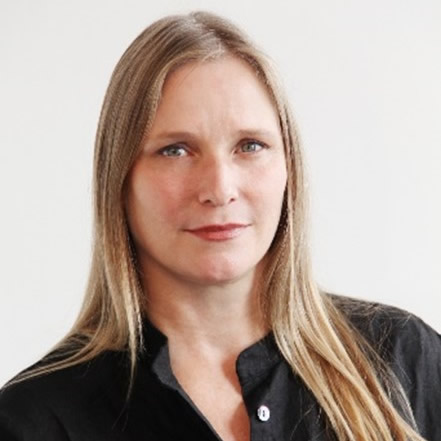
Health Systems Research Unit
South African Medical Research Council
Email: tamara.kredo@mrc.ac.za
